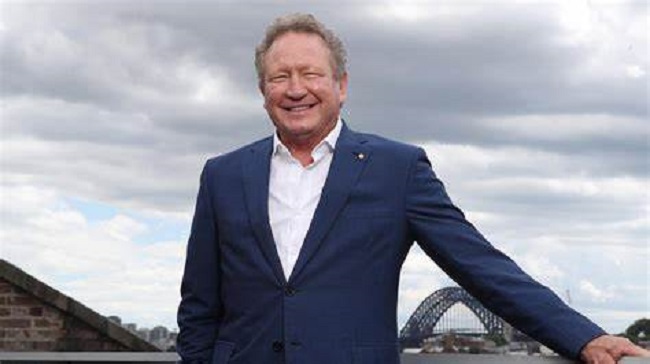At the World Economic Forum, the Australian mining company, Fortescue, has formally endorsed the proposal for a Fossil Fuel Non-Proliferation Treaty, an initiative committed to setting clear deadlines for an equitable phase out of fossil fuels and a just transition globally.

It is the first major industrial business to endorse the proposal – a significant boost to the initiative first spearheaded by Pacific Island nations and now supported by 16 nation-states across four continents.
Fortescue’s Real Zero transition plan was independently assessed against the criteria of the UN High Level Expert Group on Net Zero by Climate Integrity and the University of Technology Sydney. The assessment found alignment or partial alignment for all criteria.
“Fortescue is the first Australian company assessed by Climate Integrity to have a plan to phase out fossil fuels without carbon offsets, setting an industry-leading benchmark for climate ambition,” said Claire Snyder, Director of Climate Integrity.
Fortescue’s decision to become the largest company globally to endorse the proposal follows Fortescue Executive Chairman, Dr. Andrew Forrest’s individual support for Pacific Island nations seeking to negotiate a Fossil Fuel Treaty at COP29 in Azerbaijan in November 2024.
The announcement from the Australian company comes just weeks after the Albanese government approved four new coal projects, despite the country’s bid to host the COP31 UN climate talks, boosting growing calls from Pacific Island nations for wealthy countries to join them in negotiating a fast and fair fossil fuel phase out plan.
The announcement was made by Dr Forrest at a Fortescue-hosted roundtable at the World Economic Forum. The event, entitled “Leading a Profitable and Rewarding Switch to Green Energy by 2040”, featured executives from some of the world’s heaviest emitters.
Dr Andrew Forrest said: “If Fortescue can achieve Real Zero by 2030, there is no reason the rest of the world can’t follow by 2040. The economics make sense, and the technological solutions exist to phase out fossil fuels. While fossil fuel companies like Exxon bury their heads in the sand and while hellish wildfires cause unimaginable damage to Los Angeles, Fortescue and the growing bloc of countries seeking to negotiate a Fossil Fuel Treaty understand the need for real action to combat climate change. Negotiating aThe Fossil Fuel Treaty presents a unique opportunity to realise Real Zero at a global scale through meaningful government and corporate action. I call on other heavy emitters to endorse the Treaty proposal and commit to a future beyond fossil fuels.”
Tzeporah Berman, Co-Chair and Founder of the Fossil Fuel Non-Proliferation Treaty, welcomed the endorsement: “Fortescue’s support sets a powerful precedent for others to follow. It signals to the market that the transition to a fossil-free future is not only necessary; it is achievable and economically viable. We invite companies across all sectors to join this growing movement of countries, organisations, individuals and businesses that are pushing for a real zero emissions target, showing that this can only be achieved one way: by phasing out the production and use of fossil fuels, and by putting a decisive end to new investment.
“Together, we can chart a sustainable path that not only protects our planet, our communities and everything we love, but also unlocks new, sustainable and profitable economic opportunities, supporting governments who are charting a truly ambitious course for fossil fuel phase out and a new Treaty.”
The movement to negotiate a Fossil Fuel Treaty is wide and diverse, spearheaded by a bloc of 16 countries across four continents including the majority of Pacific Island nations, and is focused on managing an equitable phase out of fossil fuels and financing a global just transition away from the threat of coal, oil and gas production.
The growing bloc of countries includes Colombia, Timor Leste, Pakistan, and a coalition of small island nations from the Caribbean and the Pacific. The proposal has also the backing of the World Health Organisation, the European Parliament, 3,000 scientists, 101 Nobel Laureates, 123 cities and subnational governments, including the State of California, 3,500+ civil society organisations from 123 countries, 850+ elected officials from over 85 countries, 25 banks and 1 million individuals.
